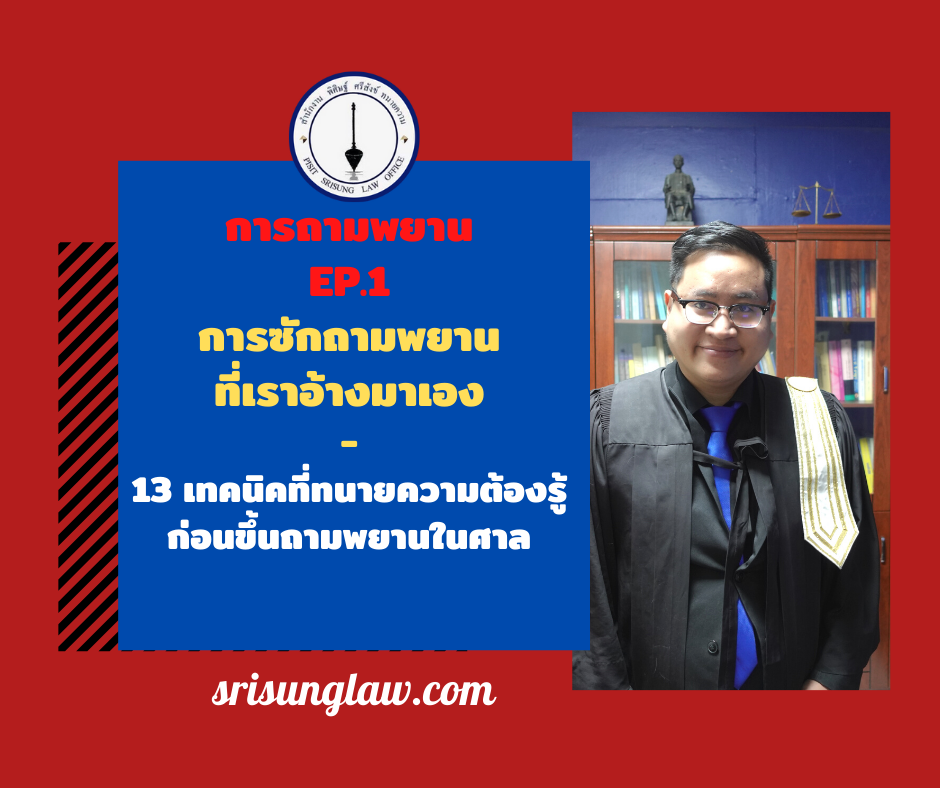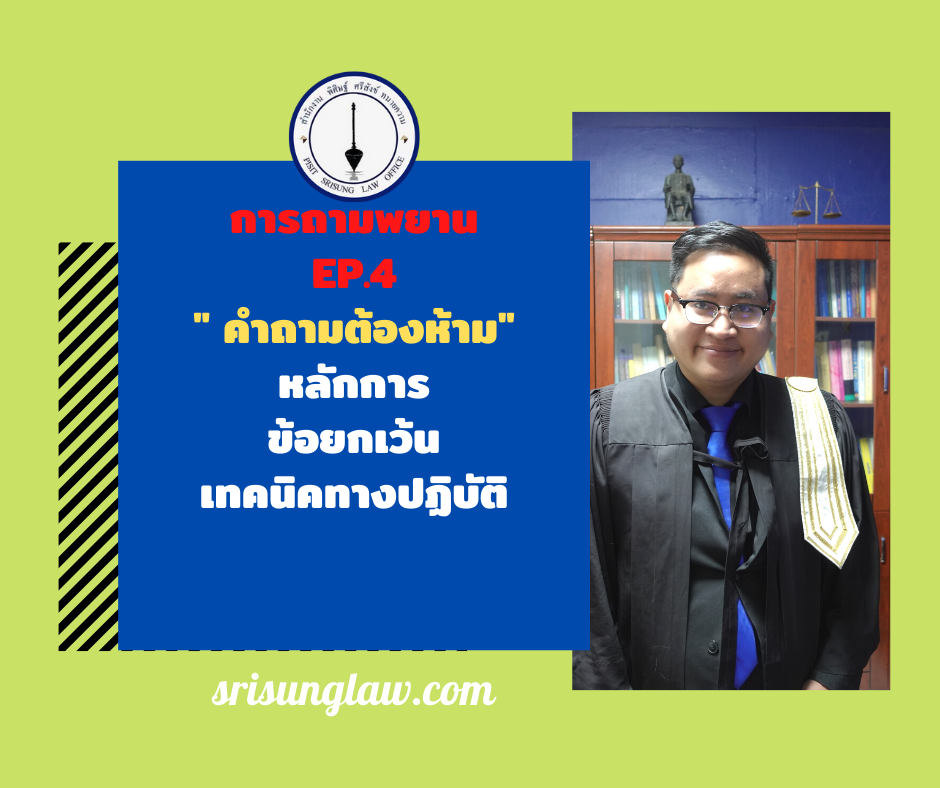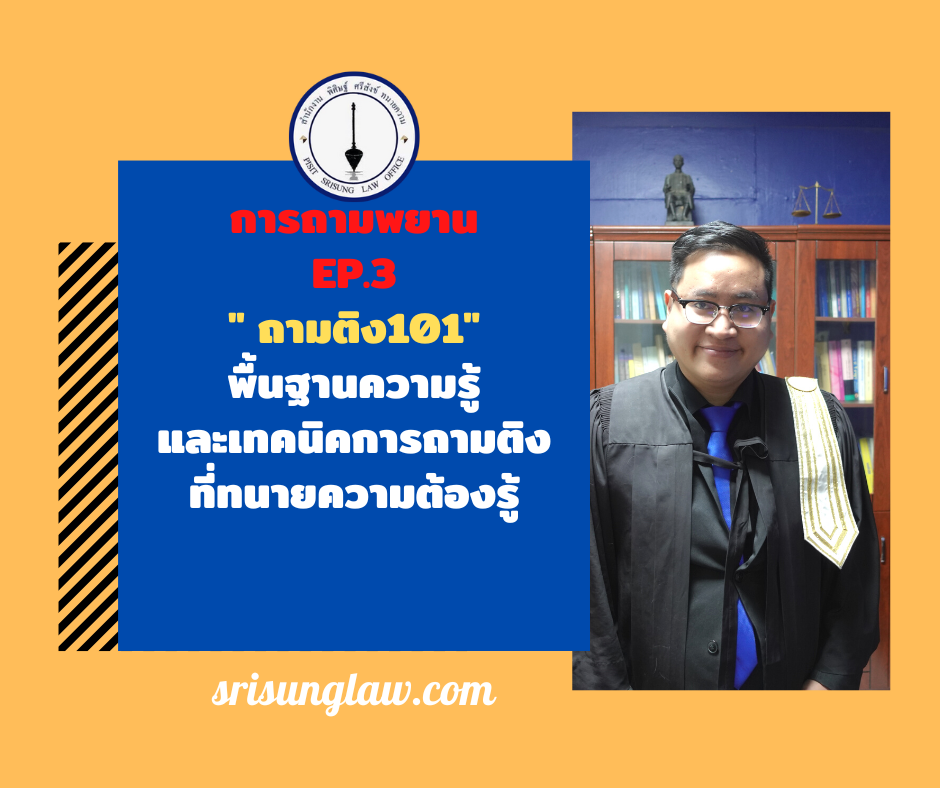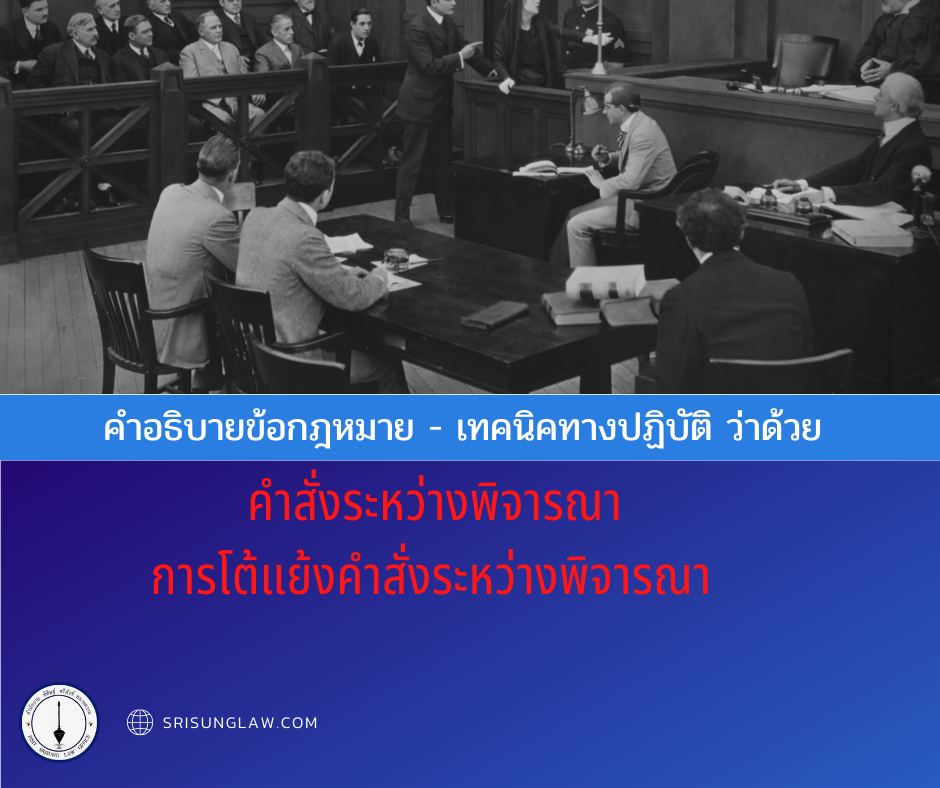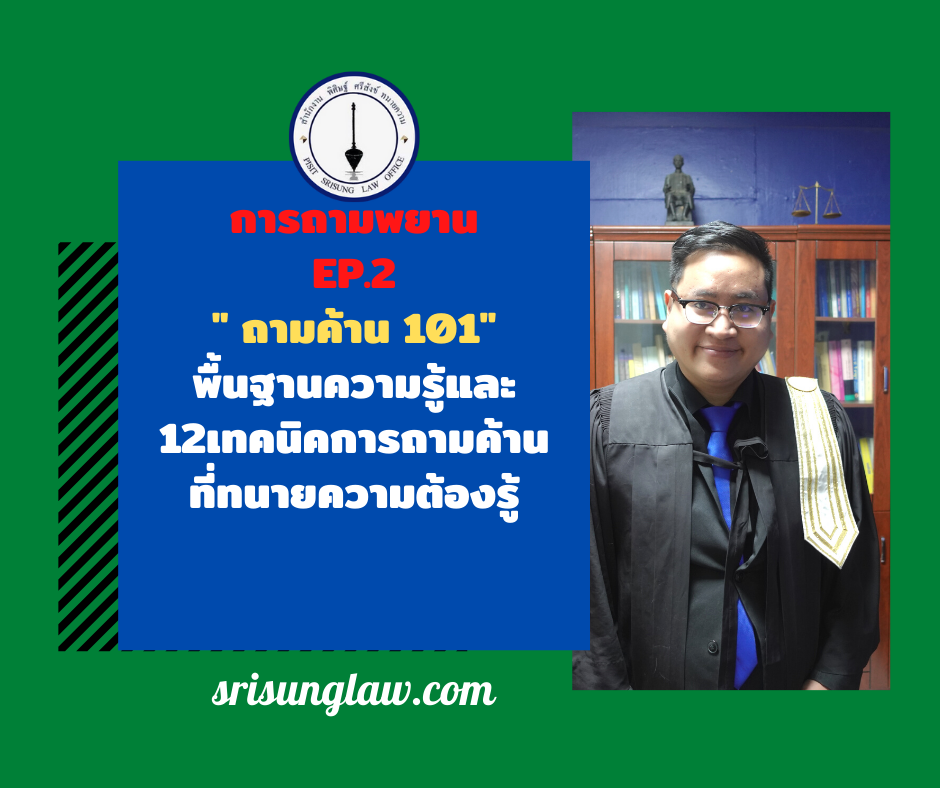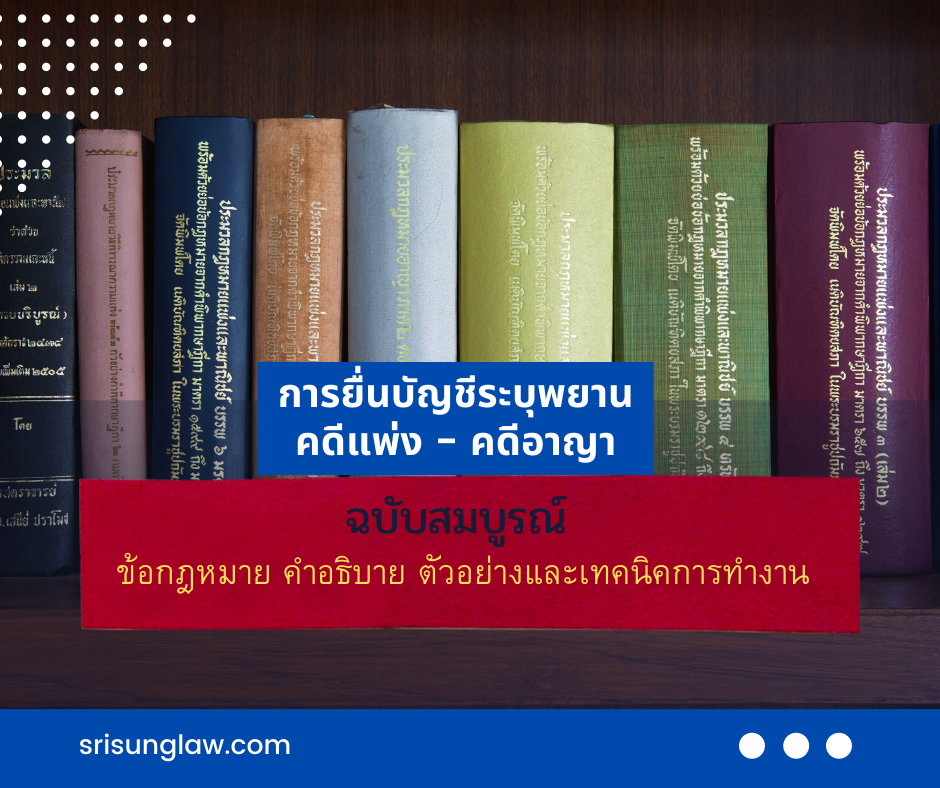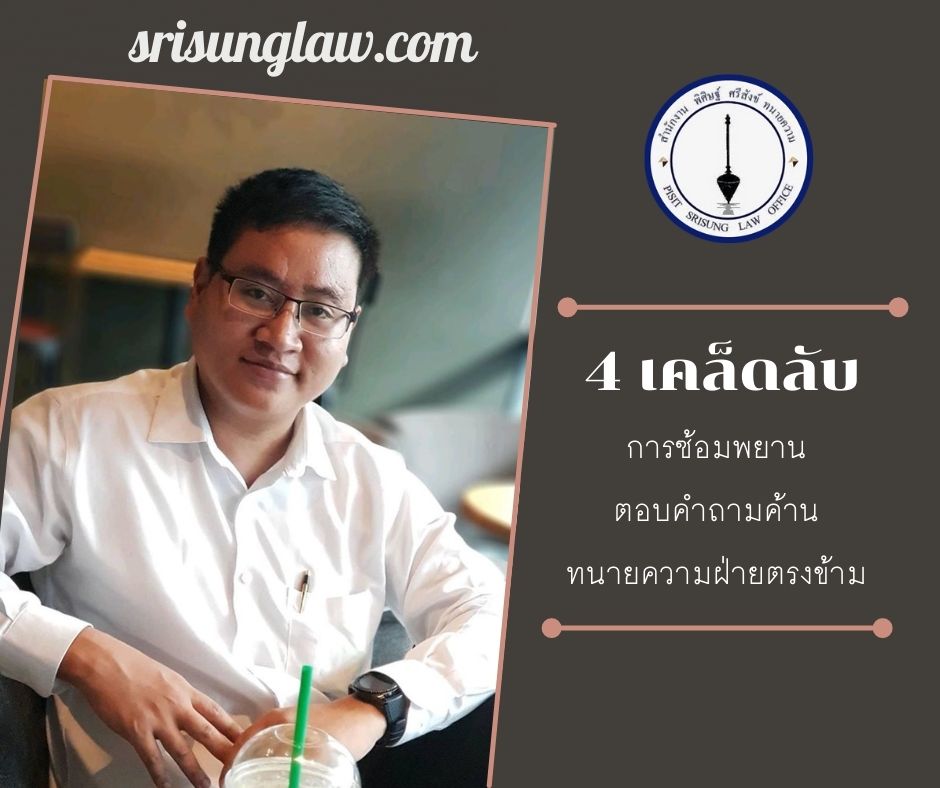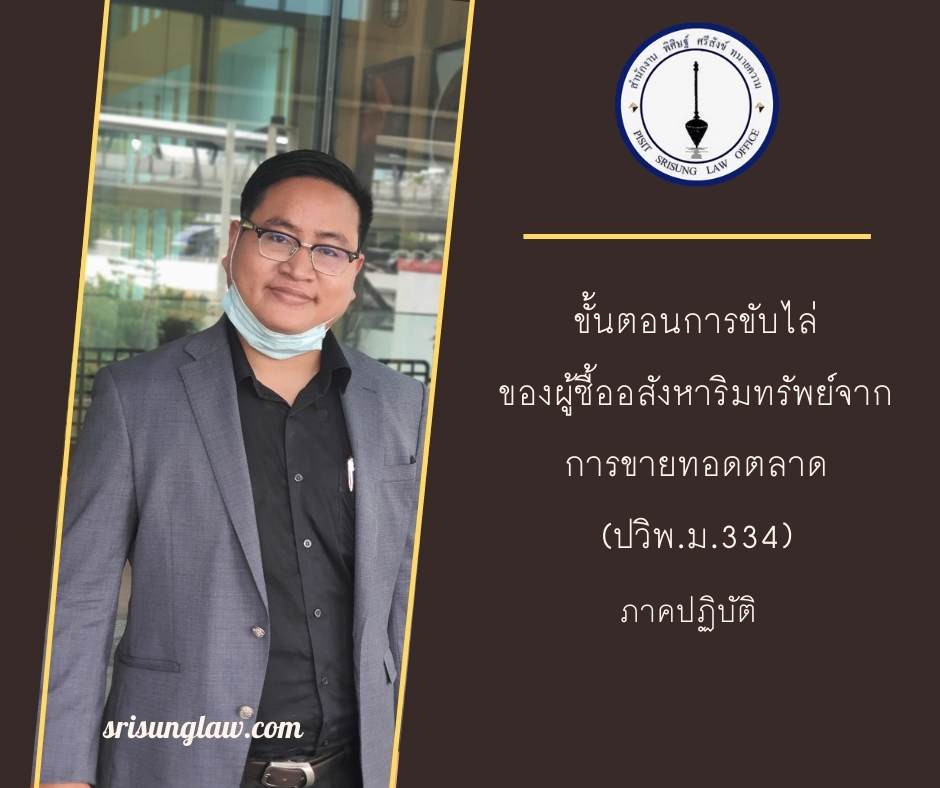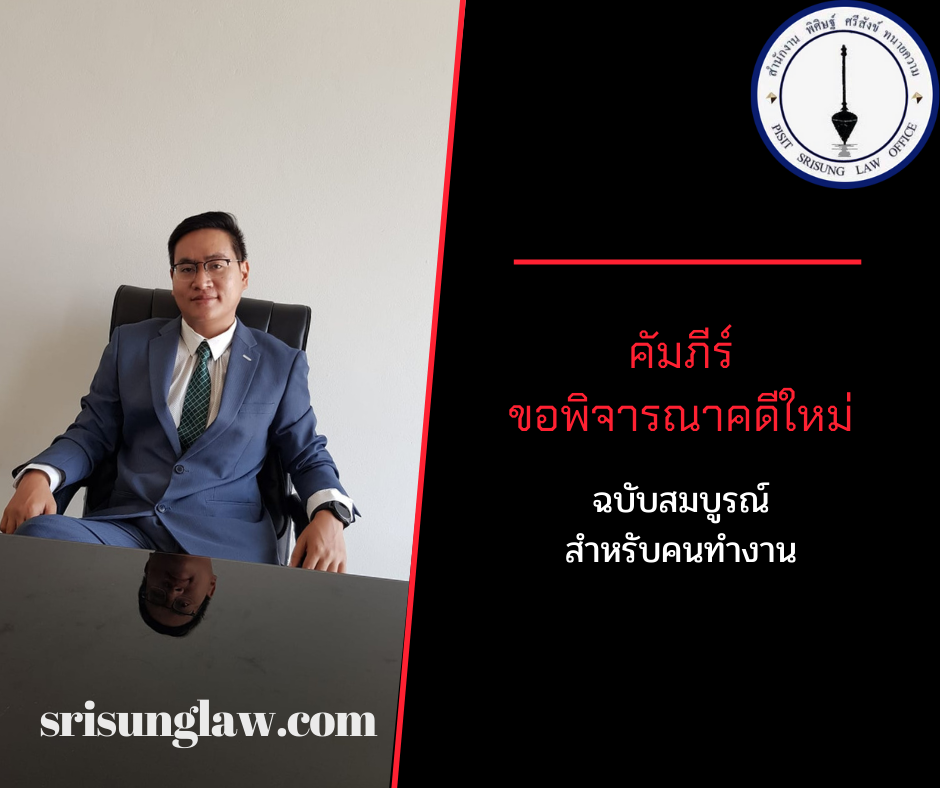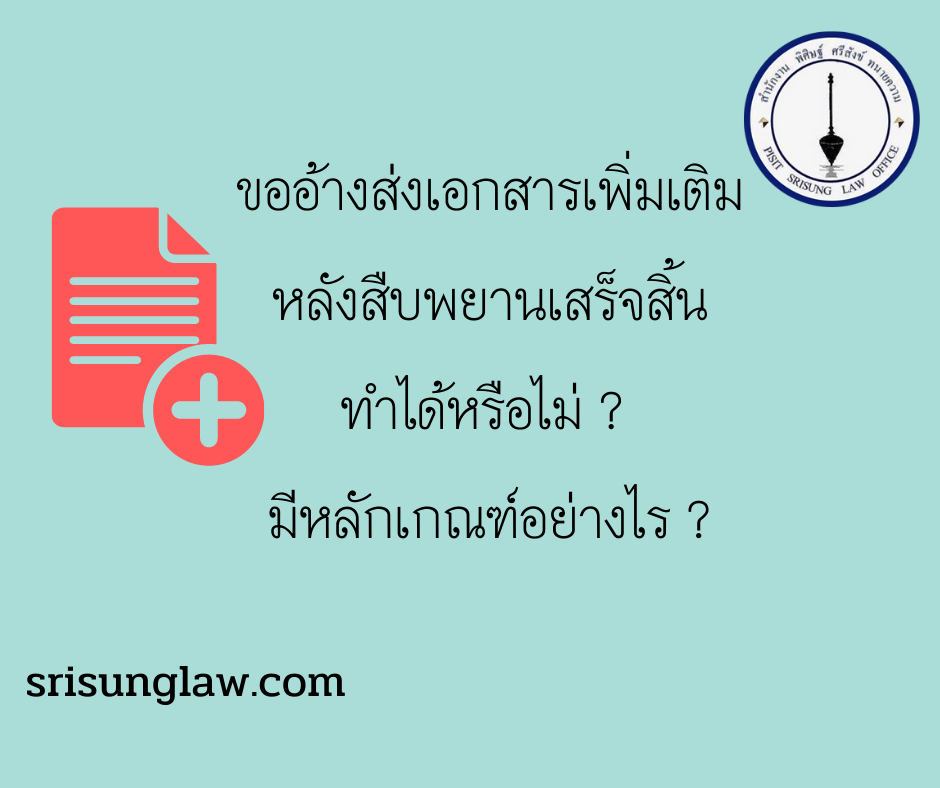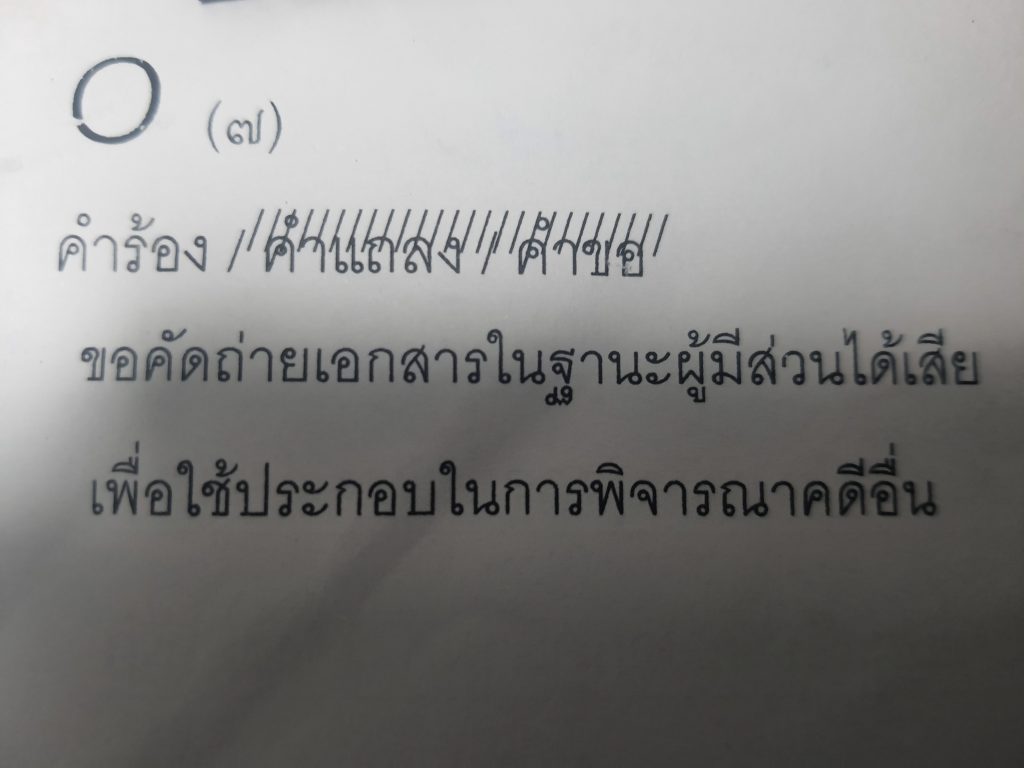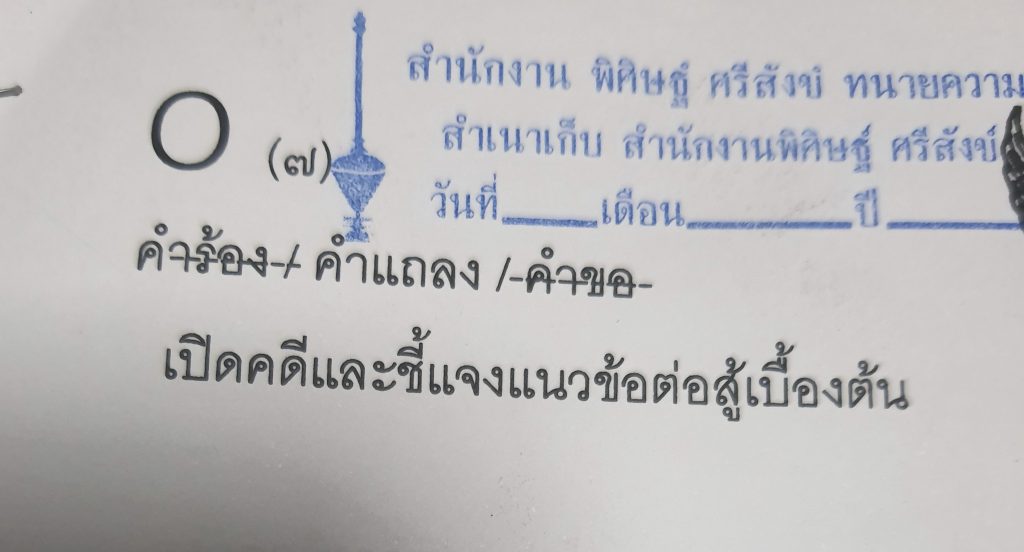Questioning witnesses. It is a job that every lawyer who represents a case in court must do. Because it is the basis of a lawyer’s work.
For the purpose of questioning witnesses WellTo allow witnesses to tell the facts that they have seen and acknowledged. for the court to record in testimony
This is for the benefit of their case. or to refute the opposition’s arguments.
Citing personal witnesses for evidence in court. The claimant must submit a list of witnesses according to law. and before witnesses testify Witnesses must swear an oath according to their religion, Section 112.
The court will then question the witnesses. to the name, surname, address, occupation, relationship of the parties, Pavip. Section 116
After that, the court will normally have the lawyer who referred the witness question that witness. To get the facts as desired
Questioning the witnesses that we have brought up ourselves. At first glance, it appears to be the simplest task of questioning all three types of witnesses: questioning, cross-examination, and cross-examination.
But the truth is questioning witnesses It is considered both a science and an advanced art. that requires experience Study and research both in theory and practice This will create maximum efficiency.
A lawyer who is good at questioning witnesses. This will allow the witness to testify at the end of the process. consistent with reason It has a reliable weight. Induce the court to believe and follow the case’s own case. Opponents are difficult to cross-examine. And if there is an immediate problem, it can be fixed immediately.
On the other hand, Lawyers who have not studied the field of questioning both from textbooks and from experienced professors I thought that when I passed the legal license exam, I went to the witness stand. Most often do not know how to ask witnesses. The question is incomplete. Lack of consistency There is no reliable weight. Opponents can easily find room for cross-examination to destroy the weight. And when immediate problems arise, they cannot be solved.
Although nowadays in the examination of witnesses in many civil cases it is popular to use the recording of testimony. Instead of questioning witnesses live like in the past.
But the basic principles in questioning witnesses are still important and can be applied to giving testimony.
In addition, if it is a criminal or civil case in which the court does not allow testimony. Lawyers must also have the ability to question witnesses.
Today I have brought techniques and things to know. What I think is useful for fellow lawyers in questioning witnesses in court is to share, a total of 13 points.
Do not use leading questions. But it is not strictly prohibited.
It is normal in questioning the witnesses we have cited. The law prohibits lawyers from using leading questions when questioning their own witnesses.
Leading questions This means that it is a question that in itself suggests an answer to the witness. Or is it a question that allows the witness to choose one fact to answer? in a suggestive manner It is not a question for our witness to tell us the facts, but a question that suggests an answer for the witness within himself.
For example
- On the day of the incident, were there any witnesses?
- Is the defendant the person who used the firearm to shoot the deceased?
- Did the defendant flee on his motorcycle?
Why the law prohibits the use of leading questions. This is because the law requires witnesses to tell the story of facts that the witness has directly experienced. Do not allow the witness to answer as the lawyer wishes to lead you to.
Otherwise, people who have no knowledge of the matter at all are willing to come and testify in court. Just answer the questions as the lawyer leads you to say yes. alone
However, the law prohibits asking questions. It is not strictly prohibited by law.
If the court allows the use of leading questions or the opposing party does not object to the use of leading questions. The lawyer for the witness claim can use leading questions in accordance with Pavip Section 118.
In some situations We may encounter witnesses who do not understand the questions. I don’t understand the issue that we want to ask about. No matter how many times I ask, the witness still doesn’t understand. Moreover, the issue we are asking is not an important issue in the case.
For example
We will ask about the date and time of the incident. Date of birth, age of the witness, location of the incident in which district, which province? Which is not an important issue in the case, it only requires the witness to testify for the completeness of the questioning.
In this case, we may ask the court for permission to ask questions.
- By requesting permission from the court that Sir, for this question, I would like permission to use the leading question….. because the witness does not understand the question and it is not an issue of advantage or disadvantage in the case.
Therefore, in questioning witnesses, we generally prohibit the use of leading questions. Unless the witness truly understands the question and it is not an important issue in the case, we may ask the court for permission to use leading questions. If the court allows it, we can ask for advice.
In the opposite direction, if we are the lawyer on the opposite side. If the opposing attorney uses leading questions in questioning witnesses and it is a central issue in the case, we should raise objections.
But if the opposing lawyer asks only a little lead because the witness doesn’t understand the question, And it is not an important issue in our case, we can just let it pass.
Use short, concise questions, asking one question at a time.
The principle of correct questioning in questioning witnesses is to ask questions as briefly and succinctly as possible. The shorter the questions, the better.
Because the longer the question, the more difficult it is for the witness to understand. What do we want to inquire about? Then it will cause the court to not understand what we want to ask the witness.
And asking questions should be asked one question at a time. Don’t ask multiple questions at once. It will make the witnesses dazed and confused. and incomplete answer
Examples of asking multiple questions at once like
- When did the witness’s father die? What is the cause? With what disease? Where did it go bad?
In fact, we should separate the above questions one by one. This will allow the witness to answer clearly without missing any words and not being confused by the questions.
For example
- When did the witness’s father die?
- What is the reason for the loss?
- Where is it broken?
- Where was your hometown before you died?
So remember that a good lawyer will ask witnesses questions that are concise and easy to understand. This allows both the witness and the court to immediately understand what we want the witness to answer.
Which lawyer uses long questions? The listener or the court cannot understand what the question means. It’s a lawyer who doesn’t have the ability to ask questions.
Use a polite, gentle tone of voice to console when the witness does not understand the question. or answer incorrectly
Using the tone of voice when questioning witnesses is one of the arts that a competent lawyer should absolutely not overlook.
Normally, a person who will testify as a witness in court There will be quite a bit of nervousness, excitement, and fear.
Even myself. Even though you are a lawyer and have experience in representing yourself, when it’s time to give evidence in court, sometimes you get excited and make mistakes.
When we are the lawyer who claims to be a witness. We should understand this fact: People who will testify in court are already excited, nervous, and afraid of making mistakes.
Therefore, we should speak to him with politeness and gentleness. If he admits a mistake, has forgotten or made a mistake, we should gently tell him in a friendly tone. and comfort him This will bring him to his senses.
But if we are upset Get emotional or scold the witness for giving false testimony or not responding to what we wanted to ask. This will cause the witnesses to become frightened and panic to the point where they may testify and completely ruin the case.
Therefore, use the tone of voice. and methods of questioning of witnesses in questioning witnesses Therefore, it is one of the most important matters in questioning witnesses.
Use language appropriate to the witness
Using language that is appropriate to the knowledge and intelligence of the witness is very important that the lawyer must know how to use appropriately.
If looking for witnesses from villagers Graduated from Mathayom 3 Such is the use of questions. You should use simple questions. Avoid using transliterated words. Foreign languages, official languages, legal languages, specialized languages, but should use simple language that ordinary people can listen to and understand.
If the witness is from the northern, northeastern, or southern regions who may not clearly understand the context or common language. If you do not understand the question, you may request permission from the court to ask in the local language or explain the question to the witness easily.
But if the witness is an educated person Be a specialized academic Who can understand specific vocabulary, legal language, and official language very well. Lawyers can use questions that are specific terminology, legal language, or official language.
Using language appropriate to the intellectual level of the witness. This will ensure that communication between us and the witnesses will not be inaccurate. The questioning of witnesses went smoothly with no errors or omissions.
Questions for in-depth reasoning
In questioning witnesses to obtain facts according to the complaint or testimony. It is not only about asking witnesses to testify and confirm the facts according to the complaint or testimony.
But there must be in-depth questioning of the reasons, origins, details, and related facts to make the testimony reasonable.
Many lawyers when giving testimony or when questioning witnesses They will inquire only according to the facts shown in the complaint.
If the witness only testified that Saw this I saw this. It alone may not have weight. Also known as false testimony.
We must ask why. and the facts include
For example
Witness testified that the defendant loaned money. You must ask about the reason why the defendant has known each other for how long. What did the defendant say was the reason for borrowing the money? How do you give money? How to pay the defendant? etc.
or for example
If the witness testifies that Went to see the defendant stealing property. We have to ask in detail. Why did you go to see the defendant? What were the circumstances during the discovery? How did the defendant dress? What was the situation after the incident?
Questioning for in-depth reasons and details in testimony. will make the testimony of our witnesses It has a reliable weight. Reasonable and consistent with the truth Rather than having witnesses testify without giving details.
Questions to close cross-questions
This technique I got from a book by Ajarn Phaisan Phuetmongkol called Witness Examination Manual
The heart of this technique is that Let us think in advance that if we are lawyers on the opposite side. How do we cross-examine these witnesses?
When thinking that What will the opponent ask? We don’t have to wait for the opponent to ask. But let us ask the witnesses to explain that point clearly.
Having witnesses explain issues that they think will be cross-examined. Reasonably and clearly from the moment of testimony, it will cause It will be difficult for the opposing side to cross-examine.
For example, a criminal case, let’s say murder. We already know that opponents will fight the issue of witnesses not recognizing the defendant. You must ask in detail.
- What were the lights like at the scene?
- How long did you have to see the defendant?
- What was the defendant’s physical appearance? What were his distinctive features?
- Why was the defendant remembered?
Question to close this cross-examination. It’s a technique that I tried to use and it appears that The results were very good. Because it allows witnesses to testify and explain the facts completely in the process. The opposing side asked in cross-examination that it would be difficult to lose weight. Therefore, I recommend that friends apply it as well.
Questions for later witnesses
In the case that the witnesses we are investigating are double witnesses. Or there are other witnesses who also saw the same facts and we would like to examine other witnesses later.
We must also ask the first witness. During the incident, did anyone else witness the incident besides the witness?
To allow witnesses to confirm that there are other witnesses who witnessed the same event
If we don’t ask, and brought other witnesses to testify later The weight of credibility will be reduced.
For example, ask: Who was there when you saw the event? for the witness to answer that Mr. B was also present in the incident.
When Mr. B is brought in as the next witness to testify, it will have more credibility.
Bringing document witnesses, material witnesses, audio clips, video clips to support questioning
Having witnesses testify to the court is In addition to allowing witnesses to tell the story of what happened as they saw it, Can also allow witnesses to testify, document witnesses, material witnesses.
For example, contracts, announcements, evidence of conversations via LINE or Facebook, video clips, or various audio clips.
To demonstrate or confirm facts according to one’s own testimony or experience
In order to bring evidence, documents, physical evidence to witnesses to testify. It’s not just about bringing documents to witnesses to certify.
However, we should allow witnesses to briefly explain the facts in detail. Appears in audio clips, video clips, documentary evidence, or physical evidence as well.
By testifying in detail. There is no need to testify about the contents of all documents or material evidence. but to testify on important issues So that the court can easily understand the content we want to convey.
For example
If we bring the contract up to question witnesses. We do not need to inquire about the contents of every contract. But you may inquire only about the contents of the contract roughly. That it is a contract between who and whom? What is the contract? and focused on inquiring about contractual issues that is a matter of dispute
or for example
If we want to use video clips to question witnesses. We have to ask the witness who shot the video clip and what the content is about. Who was at the event? Then let us focus on asking only the events that are important issues in the case. There is no need to sit down and ask about the content of the entire video clip.
Rehearse with the witness to understand the witness first
It is very important for lawyers to practice and understand the witnesses first. Before going to trial in court
People who are about to testify are naturally nervous and want to know what questions they will be asked. And if you know what questions you will have to answer, Witnesses will be less anxious and more relaxed.
Therefore, the lawyer should rehearse with the witness first what questions he or she will ask the witness. And witnesses should be advised to testify according to the truth that they know.
If the witness does not understand the question or how to answer it. You should practice to understand correctly.
A lawyer should not recommend an answer to a witness: If the lawyer asks this, answer this or advise the witness to give false testimony. Or deviate from the truth because when questioned by the opposing side, there will be an opportunity. The lie appears in court.
Rehearsing a witness involves understanding what the witness will be asked about. And how should you answer? Witness rehearsal is not about having the witness memorize lines. But emphasis is given to witnesses to understand
Rehearsing a witness in which the witness memorizes a script of questions and answers has several disadvantages. Because if there is a slight error, the witness will not be able to answer correctly, or if any complications arise or the court asks questions in the middle of the session, the entire survey will be lost.
Therefore, witnesses should be rehearsed to try to understand the whole story as a whole. will be most useful
And should advise the witness to rehearse the opposing attorney’s answer to the cross-examination. Read more in the article below.
เป็นพยานศาล ต้องอ่าน ! 4 เคล็ดลับในการตอบคำถามฝ่ายตรงข้ามในชั้นศาล
Prepare the case and understand the case in detail
Before questioning witnesses We must understand the details of that case.
If it is a civil case, you must read the complaint, testimony, and other related documents until you can understand the disputed issues in the case, both the facts and the law. You must understand whether this case will be won or lost based on the law or the facts.
If it is a criminal case, the issue of defense must be clearly stated in this case. What is the defendant’s defense? The case will be won or lost based on what facts or evidence? Then the various documents and evidence in the case must be carefully examined first as well.
In addition, the facts of the witnesses who will testify must be thoroughly examined. In order to know which witnesses we will question know the facts on which issues.
Preparing the case thoroughly will allow us to ask witnesses well and to the point because we understand the whole matter. Understand dispute issues, both facts and legal points. How should witnesses be examined in order to win the case? I understand that the witnesses who testified How do you know the facts?
If the witness answers too softly, the court cannot hear. The others couldn’t hear it.
Because in a covid situation like this, when witnesses testify, they must wear a mask to cover their face at all times. And sometimes in the witness booth there will be another layer of glass or plastic.
Usually the court sitting in the hearing will be further away from the witness than the lawyer. Many times, witnesses testify in response to attorneys’ questions. And it is often found that Witnesses testify but the court cannot hear them or cannot hear them clearly.
The court therefore recorded a statement that was different from what the witness testified. Or sometimes the witness’s testimony was not recorded at all. cause us damage
So if the witness answers softly or slowly, The court didn’t hear us, so we had to remind the witness politely and use a tone of voice that said, Please help speak a little louder so the court can hear it easily.
Efforts must be made to inform the witness that the witness has a duty to testify to the court, not to testify to the lawyer alone.
If the witness answers outside of the story Much more than asked. Must be pulled back and excised.
Normally, most witnesses who will testify in court tend to answer only as many questions as we ask and do not testify further than we ask.
However, there are some types of witnesses who tend to answer questions idly, answering continuously, or sometimes the witness may not understand the point we are asking and therefore answer the wrong point. Off topic
If you encounter a situation where the witness answers outside of the question. The answer is off topic. Testimony that is off-topic or outside of what we want to answer will require us to cut it short. Then tell the witness to help answer only what we asked.
If witnesses are allowed to testify indefinitely, In addition to causing unnecessary delays in the case and possibly causing witnesses to testify outside of the issue to the point of ruining the case.
There must be a space to wait for the court to record the testimony. As well as listening to whether the court records are correct or not.
For this technique, it is a basic matter that many new lawyers still don’t know. That is, when we ask witnesses, we must Leave space for the court to record the testimony as well.
In the past, courts would record testimony by writing. (I myself am not up to date with that either.) But nowadays, almost every court uses the method of recording testimony with a voice recorder. Then let the clerk in front of the throne type it all out.
So when we’re finished asking witnesses. We must also leave space for the court to record witness testimony.
In addition, at the time the court was recording the testimony, Most courts will speak loudly enough so that we can hear what the court records.
If the court record deviates from what the witness testified. We can request permission to explain to the court and ask the court to make corrections immediately.
The request for correction is made immediately at an early stage. It will prevent arguments better than checking the testimony all at once after typing the testimony.
For all 13 techniques for questioning witnesses we have cited. It’s something that I have tried to adapt. Saw that the results were very good Therefore, we have collected and distributed them as alms to friends who are interested. And in the next episode, I will write about “cross-examination” which is the heart of the lawyer’s profession. Anyway, let’s wait and watch.

 51/29-51-30 Village No. 4, Ban Suan Subdistrict, Mueang District, Chonburi Province
51/29-51-30 Village No. 4, Ban Suan Subdistrict, Mueang District, Chonburi Province


